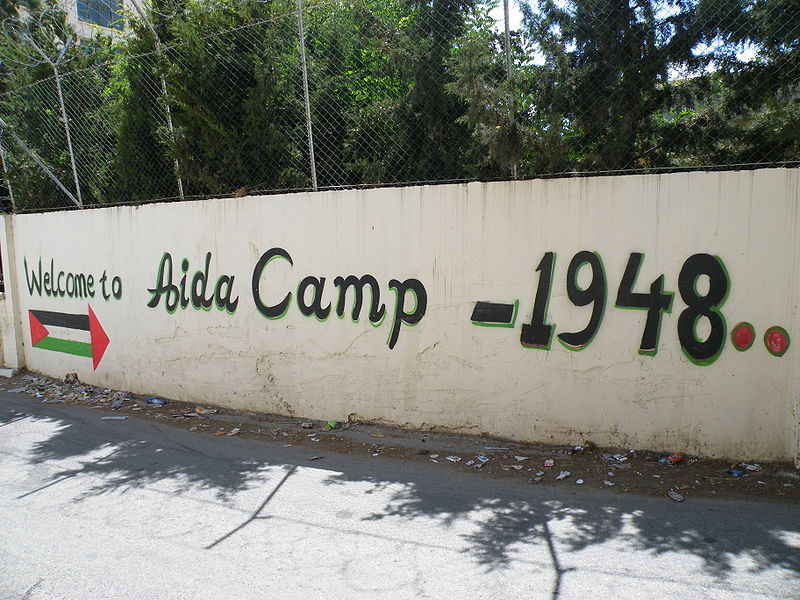Last Thursday, the Trudeau government announced another $25 million in aid to the United Nations Relief and Works Agency (UNRWA), the UN aid agency for Palestinian refugees. Within hours, Canadian pro-Israel lobby groups had criticized the decision, dredging up spurious arguments to subvert any potential public sympathy for Palestinians, refugees or otherwise. But average Canadians can reasonably be excused for asking, “Why should Canada support Palestinian refugees?”
Believe it or not, Canada is partly to blame for the fact that there are over five million Palestinian refugees today. These refugees are the descendants of Palestinians who became refugees over several months between 1947 and 1948. Canada was one of the countries at the UN which voted in 1947 to partition historic Palestine, which ultimately resulted in 700,000 Palestinians losing their homes in the territory of what became the state of Israel. Canadians should also be interested to note that no UN member states situated close to Palestine supported the partition. Turkey, Egypt, Lebanon, Syria, Saudi Arabia, Yemen, Iraq and Iran all opposed it.
Since almost 70 years have passed since the partition of Palestine, it is also reasonable to ask, “Why are these Palestinians still refugees?” The simple answer is that they have no place to go. The UN High Commission for Refugees (UNHCR) suggests three ways to solve refugee crises: Repatriation, integration, or resettlement. Unfortunately for Palestinian refugees, none of these have been an option.
The repatriation of Palestinian refugees would mean that they would return to homes and land in Israel — an option which has been anathema to every successive Israeli government since 1948. Rightly or wrongly, since its founding, Israel has never allowed Palestinian refugees to return legally.
The integration of Palestinian refugees today into their host countries has not been an option either. Millions of these refugees live in Lebanon, Jordan and Syria, but these countries have no motive to absolve Israel and the West of their accountability for Palestinian refugees. Legally and politically speaking, there is no reason these countries need provide a long-term solution to the Palestinian refugees who surged over their borders in the late 1940s.
Conditions for Palestinian refugees in these countries vary somewhat, but most refugees face huge challenges — often formal legal obstacles — to enjoying their civil liberties, entering their profession of choice, traveling as they wish, living where they want, and more. Refugees in Gaza and the West Bank face fewer issues, but remain among the poorest in these territories. One could argue that such countries should accept Palestinian refugees on humanitarian grounds and offer them citizenship. But the same could be said for Israel — that is where the refugees’ homes are.
The third possible solution — resettlement of Palestinian refugees to third countries like Canada — accommodates only a trickle, and will never make a dent in the overall numbers.
Facing the dilemma of Palestinian refugees, the international community created UNRWA, and the agency began operations in 1950. Given the absence of solutions for Palestinian refugees, they remain under the care of UNRWA, and do not receive services from the UNHCR. UNRWA does its own fundraising, and continues operations through the generosity of governments around the world. The U.S., the E.U. and Saudi Arabia provided over half of UNRWA’s funds of $1.2 billion in 2016. Canada’s contribution of $25 million CDN represented only about 1.5 per cent of the agency’s 2016 budget.
Were UNRWA to be shut down, however, the care of its refugees would inevitably fall to the UNHCR.
Seventy years is a long time for 700,000 people and their descendants to live as refugees. During these 70 years, refugees in places all around the world have fled their homes, and been repatriated and/or resettled: Refugees from the 1973 South Africa-Namibian war; refugees from the 1983 clash between Greek and Turkish Cypriots; refugees from Bosnia and Kosovo from the war in the early 1990s; and elsewhere.
But unlike these other conflicts, the world seems powerless or unwilling to address the challenge of Palestinian refugees. While Palestinian refugees wait for decades in overcrowded and underserviced camps, Canada and the West continue to apply Band-Aids to the crisis. In 2016, and now in 2017, Canada and other Western countries cough up funds annually, seemingly in the hope that the Palestinian refugee crisis will magically go away. But it will not.
Honestly, Canada shouldn’t still be supporting Palestinians refugees: Palestinian refugees should have had their status resolved decades ago. Canada — especially as gavel-holder for the UN refugee working group — should have been working diligently with international partners to ensure a peace agreement long ago between Israel and the Palestinians. Rather than applying palliative annual aid packages to impoverished Palestinians, the Trudeau government and its Western allies must compel Israel to accept a peace agreement which respects the legitimate rights and grievances of the Palestinians.
Otherwise, one day a few years from now, we may find ourselves observing that Syrian refugees fled their country’s civil war, but were later repatriated and resettled — while Palestinian refugees still languish in refugee camps.
Image: Wikimedia Commons
Like this article? Please chip in to keep stories like these coming.




